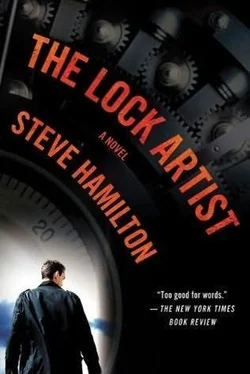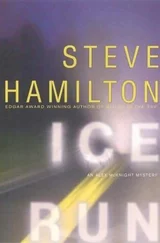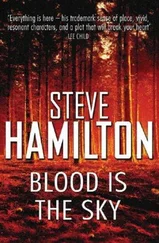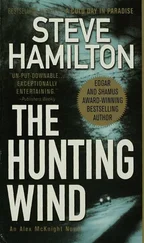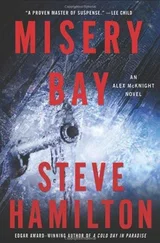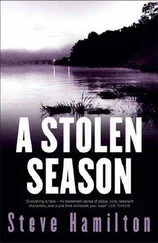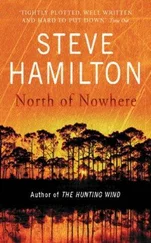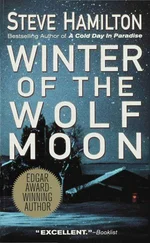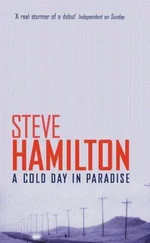I kept going. I knew we were close. Then I saw the bridge.
The bridge over the River Rouge.
I looked at the street signs. Just before we got to the bridge, I took that last left turn. The last turn before the river. We were on Victoria Street now. I rolled to a stop.
“Is this it?” she said. The wind was still buzzing in my ears. “Is this really where you lived?”
Now understand, this has nothing to do with the city of River Rouge. Or the people who live there or the businesses or the streets or the river itself. It is a place like any other place, where you grow up and you go to school and you make your stand against the world. If you go to this particular street, though, you’ll be just as amazed as Amelia was when we got off the bike and looked around and breathed that air.
There are six houses on the southern side of Victoria Street. On the northern side is the plant where they make wallboard, a city unto itself of brick and steel, of pipes and smokestacks and water towers and huge mounds of gypsum.
“Is the air always like this?”
Amelia covered her mouth with her hand. Besides the gypsum, there was the salt from the salt plant just up the river, the coke and the slag from the two iron plants. Not to mention whatever came out of the wastewater plant. Or from the storm drains, whenever it rained.
“Which house did you live in?”
I walked down to the street and stopped in front of the house. She followed me. It was a simple one-story house. Inside, a small living room, a small kitchen. Three bedrooms. One bathroom. An unfinished basement. At least that’s what I remembered. I lived here from the time I was born until that day in June of 1990. Kindergarten, first grade, second grade. Playing outside in the tiny backyard on those days when the air wasn’t too bad. Inside on all the other days.
As I looked at the house, I knew it was empty. I knew it had been empty for ten years. Nobody would buy this house. Nobody would live inside these walls. Never mind the air or the industrial blight across the street. You wouldn’t go into this house for one second if you knew what had happened here.
And everybody knew. Everybody.
The whole street looked abandoned. I opened up one of my luggage bags and grabbed a flashlight. Then I took Amelia by the hand and led her up the two front steps to the door. I tried the knob. It didn’t turn. I got out my tools and started in on the lock.
“What are you doing?”
It didn’t take long. Less than a minute. I turned the knob and pushed the door in. I took her hand again and led her inside.
The first thing that hit me was how cold it was. Even after a warm September day, the unnatural chill in this place… the lights from the plant came streaming in through every window, so it wasn’t that dark, but still I felt myself wanting to reach for a light switch. To fill the place with a warmer light than this pale glow that made everything look like it was underwater.
Amelia didn’t say anything. She followed me as I walked through the living room, our footsteps creaking on the wooden floors. There was no carpet. I remembered that. Other things coming back to me, like where the television was. Where the couch was that my mother would sit on while I was on the floor, watching cartoons.
We went into the kitchen. The tile had curled up in places. The old appliances were still in place.
“Why is this house still here?” she said. “Why haven’t they torn it down?”
Yes, I thought. Tear it down. Burn the lumber and everything else that will burn. Take the ashes and bury them in the ground.
I led her back out, through the living room to the hallway, where it got much darker. She gripped my hand tighter, and I took her past the bathroom, past the master bedroom, past my own bedroom from way back when. To the extra room at the very back of the house.
This door was closed. I pushed it open.
It was empty. There was still a roller blind on the window. I went to open it and the whole thing fell off the window with a crash.
“Okay, I’m getting a little nervous in here.” Her voice was small in the middle of this emptiness.
I looked along the floor for the faint indentations in the wood. Four of them. They were centered against the back wall.
I took out my pad of paper and my pen. I started to write, holding the pad up to the dim moonlight that came in through the window. Then I put the pad back in my pocket. There was no way I could do this and make her understand what it felt like. This whole trip was a horrible mistake.
“So show me,” she said. “I want to see what happened.”
I shook my head.
“There’s a reason we’re here. Show me.”
I took out the pad again. I started to draw a picture. But I didn’t have room on the pad. How could I do this on a stupid little pad of paper? I ended up throwing it against the wall.
That’s when I got the idea.
It was plaster, with a simple coat of off-white paint. It had always been that way. No bright colors for this house. No wallpaper.
I turned on the flashlight. I went to the wall, and I started drawing with my pen. Amelia came over to me and watched over my shoulder. I drew a picture of a little boy reading a comic book in a living room. I drew a woman smoking a cigarette and watching television. My mother. On the couch next to her… this was the tricky part. A man with a drink in his hand. But not the father. How do you make that clear? This man is not the father.
“Michael, do you have stuff out on your bike? Pens? Pencils?”
I nodded.
“I’ll be right back.”
What? You’re going to leave me here?
“It’ll only take a second. You keep doing what you’re doing.”
She left the room. I heard her footsteps, and I felt the air shift as she opened the front door. It was just me and the ghosts for a long minute or two. I fought off the feeling that I was trapped here forever now. That the door was locked and she’d never come back.
Then the door opened again, and she reappeared in the room. She was carrying my wooden art box. Everything I’d need to do this for real.
Especially if she helped me.
When I finished the first panel, she came behind me and started filling in some of the details. The second panel went a lot faster. I just sketched in the general idea, and then she finished it while I went on to the third.
That’s how we did it. That’s how I finally told her this story. On this one September night, in this half-dark empty room, me and Amelia together again, filling up the walls.
June 17, 1990. Father’s Day. This is the day that happened then and is still happening. This is the day that lives outside of time.
I am sitting on the floor of the living room, reading a comic book. My mother is on the couch, smoking a cigarette. The man I call Mr. X is sitting on the couch next to her. He is not my father, but even though it is Father’s Day, there he is on the couch with my mother.
His last name really does start with the letter X , but it’s a name I can never quite remember. Xeno? Xenus? Something like that. Anyway, that’s why he is Mr. X.
He’s been coming around a lot lately. I don’t mind too much because for the most part he treats me okay. He brings me lots of comic books, for one thing. The very comic book I am reading on this day had come from him. From the little suitcase that he brings with him sometimes. He buys the comic books and he gives them to me and then sometimes he goes into the bedroom with my mother while I am reading them.
I am eight years old, but I am not a dummy. I know the comic books are a way to keep me occupied. I play along because, hey, what can I do to stop them? They’re going to do what they’re going to do, and at least this way I’m getting comic books!
Читать дальше
